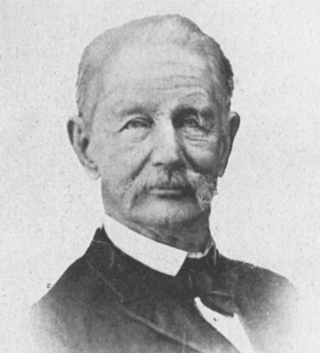Hermann Burmeister

Karl Hermann Konrad Burmeister (15 January 1807 – 2 May 1892) was a German Argentine zoologist, entomologist, herpetologist, and botanist. He was born in Stralsund and died in Buenos Aires.
Career
He studied medicine at Greifswald and Halle, and in 1830 went to Berlin to qualify himself to be a teacher of natural history. He was soon after appointed an instructor in the gymnasium at Cologne.[1] He later became a professor of zoology at the Martin Luther University of Halle-Wittenberg from 1837 to 1861. In 1848, during the revolutionary excitement, he was sent by the city of Halle as deputy to the national assembly, and subsequently by the town of Leibnitz to the first Prussian chamber.[2] He traveled to Brazil from 1850 to 1852 and Argentina from 1857 to 1860, returning to Germany with zoological collections. In 1861 he went to live in Argentina, founding the Institute at the Museo Nacional in Buenos Aires. He also headed the Academy of Sciences, formed from the scientific faculty of Argentina's National University of Córdoba.[2]
In the field of herpetology he described many new species of amphibians[3] and reptiles.[4]
Bibliography
- 1829 De insectorum systemate naturali. 40 pp. Grunert, Halle. [1829.??]
- 1832 Handbuch der Entomologie Vol. 1, xvi+ 696 + [2] pp. Reimer, Berlin. [after 1832.10.31]
- [1835] Bericht über die Fortschritte der Entomologie 1834-35. Arch. Naturgesch. 1(2): 7-74.
- 1837 Handbuch der Naturgeschichte. [Part 2] xii + pp. 369–858. Enslin, Berlin. [1837.??]
- 1851 u. 1853Geologische Bilder zur Geschichte der Erde und ihrer Bewohner, 2 Volumes.- Verlag von Otto Wigand, Leipzig, 312+326pp
- O. Taschenberg "Karl Hermann Konrad Burmeister" Leopoldina, 29: 43-46; 62-64; 78-82; 94-97. Halle (1893)
- C. Berg "Carlos Germán Conrado Burmeister. Bio (with a portrait)" Anales Museum of Natural History in Buenos Aires, 4: 315-357. Buenos Aires, Argentina (1895)
- C. Berg "Carlos Germán Conrado Burmeister. Bio" Anales de la Sociedad Argentina Science, 41: 97-107. Buenos Aires, Argentina (1896)
- Anonymous "Germán Burmeister, 25 † anniversary of his death" Physis, 3 (14): 305-306. Buenos Aires, Argentina (1917)
- B. Houssay "The personality of German Burmeister" Physis, 19 (53): 279-283. Buenos Aires, Argentina (1942)
- WITNESS Mendilaharzu "Burmeister unpublished" Deutsche Lehrerzeitung für Argentinien: 22-25. Buenos Aires, Argentina (1942)
- C. Withaus "Germán Bumeister. Memorias del Museo de Entre Rios." Parana Province of Entre Rios, Argentina (1942)
- G. Araoz Alfaro "A wise German in the service of Argentina, German Burmeister" Argentine-German cultural institutions, pp. 1–15. Buenos Aires, Argentina (1943)
- R. Ardissone "Homage to Burmeister. Burmeister contribution to geography" Bulletin EAG, (35): 9-10. Buenos Aires, Argentina (1957)
- A. Burkart "Burmeister as botanical" Revista de la Universidad Nacional de la Plata, 4: 89-95. La Plata, Buenos Aires, Argentina (1958)
- M. Buraben "Germán Burmeister, his life, his work" Cultural issues Argentinas, pp. 1–95. Buenos Aires, Argentina (1968)
- K. Müller "Hermann Burmeister" Die Natur, 36 (NF, 13): 136-138. Halle (1887)
- M. Asua "Official support for the Physics Description de la République Argentine H. Burmeister" Quipu, 6 (3): 339-353. México (1989)
- NT Auza "Germán Burmeister and Paleontological Society 1866-1868" Investigations and Trials, 46: 137-155. National History Academy. Buenos Aires, Argentina (1997)
Other works
- Beiträge zur Naturgeschichte der Rankenfüsser (Cirripedia)
- El Campo del Cielo (Territorio del Chaco) : extracto de un informe presentado /por el naturalista viajero Carlos Burmeister
- Beschreibung einiger neuen oder weniger bekannten Schmarotzerkrebse : nebst allgemeinen Betrachtungen über die Gruppe, welcher sie angehören
- Die Labyrinthodonten aus dem bunten Sandstein von Bernburg : zoologisch geschildert
- Die Organisation der Trilobiten aus ihren lebenden Verwandten entwickelt : nebst einer systematischen Uebersicht aller zeither beschriebenen Arten
- The organization of trilobites, deduced from their living affinities : with a systematic review of the species hitherto (with Thomas Bell and Edward Forbes)
- Systematische Uebersicht der Thiere Brasiliens : welche während einer Reise durch die Provinzen von Rio de Janeiro und Minas geraës gesammlt oder beobachtet Wurden (Vols. 1-3)
- Beiträge zur näheren Kenntniss der Gattung Tarsius
- Lehrbuch der Naturgeschichte
- Revision del género Ecpantheria
- Description physique de la République Argentine d'après des observations personelles et étrangères (with Emile Daireaux,and E. Maupas) (Vols. 1-5)
- Genera quædam insectorum. Iconibus illustravit et descripsit Hermannus Burmeister ...
- Grundiss der Naturgeschichte : Für Gymnasien und höhere Bürgerschulen
- A Manual of entomology, / tr. from the German of Dr. Herman Burmeister by W. E. Shuckard, with additions by the author, and original notes and plates by the translator
References
- ↑
 One or more of the preceding sentences incorporates text from a publication now in the public domain: Ripley, George; Dana, Charles A., eds. (1879). "Burmeister, Hermann". The American Cyclopædia.
One or more of the preceding sentences incorporates text from a publication now in the public domain: Ripley, George; Dana, Charles A., eds. (1879). "Burmeister, Hermann". The American Cyclopædia.
- 1 2
 Wilson, James Grant; Fiske, John, eds. (1900). "Burmeister, Karl Hermann Konrad". Appletons' Cyclopædia of American Biography. New York: D. Appleton.
Wilson, James Grant; Fiske, John, eds. (1900). "Burmeister, Karl Hermann Konrad". Appletons' Cyclopædia of American Biography. New York: D. Appleton. - ↑ Amphibian Species of the World 5.5. research.amnh.org/vz/herpetology/amphibia.
- ↑ The Reptile Database. www.reptile-database.org.
- ↑ "Author Query for 'Burmeist.'". International Plant Names Index.
Further reading
- "Hermann Burmeister," in Tom Taylor and Michael Taylor, Aves: A Survey of the Literature of Neotropical Ornithology, Baton Rouge: Louisiana State University Libraries, 2011.
External links
- Jens Andermannn-Relics and Selves
-
 Cooper, Thompson (1884). "Burmeister, Hermann". Men of the Time (eleventh ed.). London: George Routledge & Sons. p. 192.
Cooper, Thompson (1884). "Burmeister, Hermann". Men of the Time (eleventh ed.). London: George Routledge & Sons. p. 192. - Gaedike, R.; Groll, E. K. & Taeger, A. 2012: Bibliography of the entomological literature from the beginning until 1863 : online database - version 1.0 - Senckenberg Deutsches Entomologisches Institut.
|